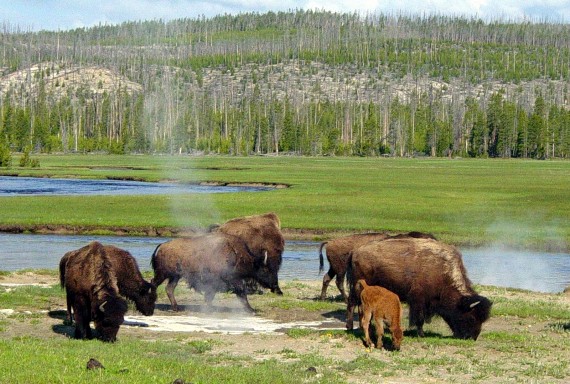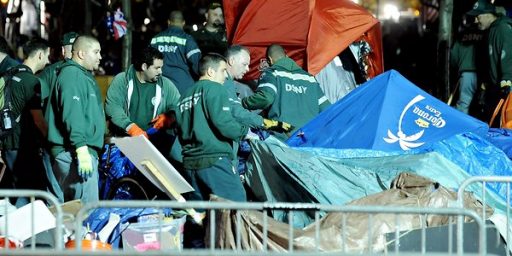Yellowstone’s ‘Zone Of Death’: Where You Can Get Away With Murder
Vox’s Dylan Matthews writes about what appears to be a really big loophole in the law:
Let’s imagine Daniel and Henry are vacationing in Yellowstone National Park, and set up camp in the 50 square miles of the park that are in Idaho (unlike most of the park, which is in Wyoming). They get into a fight and Daniel winds up killing Henry. But rather than bury the body and try to cover up the crime, Daniel freely admits to it and surrenders himself to the authorities.
At his trial, he invokes his right, under the Sixth Amendment, to a jury composed of people from the state where the murder was committed (Idaho) and from the federal district where it was committed. But here’s the thing — the District of Wyoming has purview over all of Yellowstone, even the parts in Montana or Idaho. So Daniel has the right to a jury composed entirely of people living in both Idaho and the District of Wyoming — that is, people living in the Idaho part of Yellowstone. No one lives in the Idaho part of Yellowstone. A jury cannot be formed, and Daniel walks free.
That scenario is fiction, but all the legal maneuvers Daniel employs are completely legitimate, and someone in a similar situation could quite possibly get off scot free. That got a lot of attention when it was first pointed out by Michigan State law professor Brian Kalt in his 2005 Georgetown Law Journal article, “The Perfect Crime.” After all, it implied that there was a 50 square mile “Zone of Death” of the United States where you can commit crimes with impunity, like in The Purge or something. The scenario even got featured in a best-selling mystery novel, Free Fire by CJ Box, who consulted Kalt when writing the book.
What’s more, the Zone of Death had a simple fix: Congress could simply pass a law placing Idaho’s portions of Yellowstone inside the District of Idaho. Montana’s less of a problem, since a handful of people actuallydo live in its part of Yellowstone and could be summoned as a jury, but Congress might as well giveMontana’s portion of Yellowstone to the District of Montana too.
So Kalt set about trying to get Congress to do just that. Nine years later, the Idaho loophole persists. And it wasn’t because Congress just didn’t hear about it; several members became aware of the loophole. Here’s the story of how Congress managed to leave a 50 square mile Zone of Death standing despite it being known for nearly a decade.
How exactly could this be the case? Well, Professor Kalt explained it this way in a 2005 interview with NPR:
Professor BRIAN KALT (Michigan State Law School): Yes. There’s a small portion of Yellowstone National Park that spills over the Wyoming border into Idaho and another small part that’s in Montana that would create an almost perfect crime.
SIEGEL: Now what is so special about, we’ll say, the non-Wyoming portions of Yellowstone Park?
Prof. KALT: Well, the problem is that the federal District Court for the District of Wyoming is defined as including all of Yellowstone Park, including that 50-square-mile swath of Idaho. And the Sixth Amendment requires that when a crime is committed, that the jury be drawn from the state and district where the crime was committed. And the trial is supposed to be in the state where the crime was committed. So if you commit a crime in the Idaho portion of Yellowstone National Park, the jury should be drawn from among the ranks of Idahoans but also from the District of Wyoming. And unfortunately the population of that area is zero.
SIEGEL: (Laughs) Of humans, at least. You would not be able to assemble a jury of people who come from where you committed the crime because there are no people there.
Prof. KALT: Right. And in the Montana portion, there are about 40-plus people of jury age, and it might be hard to get a jury of 12 out of that.
SIEGEL: So after committing a crime in the Idaho portion of Yellowstone National Park, one could claim, `There is no way I could possibly have the kind of trial guaranteed me by the Constitution of the United States, and therefore you can’t try me.’
Prof. KALT: That would be the argument.
As Matthews notes, this jurisdictional issue did come up for the first time several years ago:
Michael Belderrain, who had illegally shot an elk in Montana in December 2005, cited Kalt’s article in his own defense in July 2007. Belderrain was standing in Yellowstone when he fired the shot, and dragged the elk’s head to a truck parked in Yellowstone, so he was indicted in the US District Court for the District of Wyoming. He objected that he had a right to be tried by jurors from the Montana portion of the park. That’s actually somewhat possible, as the Montana part of Yellowstone is inhabited, but there are few enough residents that a trial would be difficult.
Rather than try to call such a jury or present an argument for why the Sixth Amendment did not entitle Belderrain to such a trial, the court dismissed the argument out of hand, precisely because it would imply that Yellowstone contains a Zone of Death. There were three problems with this. First, as Kalt notes, Congress implies there’s a Zone of Death, not the attorney making the point in court. Second, the ruling was about Montana, in which there wouldn’t be a Zone of Death even if the court accepted Belderrain’s reasoning due to people living in the Montana portion of Yellowstone. Third, the court flagrantly ignored Article III of the Constitution’s separate right to a trial in the state of the crime by not moving the trial to Montana.
Belderrain ended up entering into a plea deal rather than testing the issue on appeal. However, one would think that Congress may want to address this issue before a Court has to do so in a more serious case.







Two hundred crime novelists just sat down at their computers to get proposals off to their agents.
Somewhat similarly, there used to be an area called The Wedge which was neither part of Pennsylvania nor Delaware, though both claimed it. This became a favorite area to hold duels, as jurisdictional issues could prevent any murder trials.
This is the first (and, Allah willing, last) I’ve heard of anyone having a right to be tried for a state crime in any particular federal district.
@CSK:
Probably not 200…but you know damn well Reynolds did!!!!
@Jeff: Murder in a “federal reservation” – National Park in this case – is a Federal crime. 18 USC 1111 – that’s what Timothy McVeigh was convicted of, IIRC.
Meaning someone who commits murder in the “zone of death” can only be prosecuted for murder in Idaho, under Idaho law – exactly the same as if he committed the same murder anywhere else in Idaho.
Amusing, but the Rumplestiltskin Defense rarely works in practice, no?
@Jeff: I believe Yellowstone is considered exclusive federal jurisdiction, as such, it would have to be charged in federal court, which is where you get this problem. You can’t charge the accused in Idaho state court because the state does not have jurisdiction.
You can get some odd ball jurisdictional issues on military bases in the U.S. as well. Some bases are like Yellowstone, exclusive federal jurisdiction some are under concurrent jurisdiction.and there are some that are actually a mix of those two and depending on where the crime was committed on the base, you could be subject to just federal or both federal and state jurisdiction. And if the crime starts under one set of jurisdictional rules but continues into another area with different rules, it can get … interesting.
@David in KC:
My understanding is the same grey area exists in federal prisons. They all have slightly different arrangements with the states in which they reside, but in all cases the states have reserved the right to enforce state laws within those facilities.
This may be a reason the states are fighting so hard to keep Gitmo detainees out. They theoretically could be sued for failing to spring people being held without trials.
Or so I’ve heard…
Oh, crap…
Excuse me, I need to cancel the vacation plans my wife made…
@CSK: Think of the movie and tv possibilities. A real survivor series!
I saw “The Purge”. Not bad, actually good until the messed up ending. They will have a new one out this fall I believe.